The Coming of Conan Re-Read: “Queen of the Black Coast”
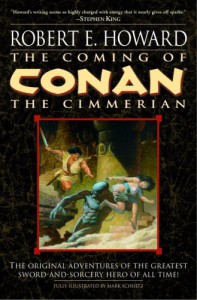 Bill Ward and I are reading our way through the Del Rey Robert E. Howard collection The Coming of Conan. This week we’re discussing “The Queen of the Black Coast.” We hope you’ll join in!
Bill Ward and I are reading our way through the Del Rey Robert E. Howard collection The Coming of Conan. This week we’re discussing “The Queen of the Black Coast.” We hope you’ll join in!
Bill: There’s a wonderfully vivid moment of stillness at the heart of “Queen of the Black Coast;” Conan sits high on the ruined pyramid of a vanished race as night falls over a scene of slaughter, the “black colossus” (which becomes the title of the next story) of the jungle a vast sea of darkness that enfolds him. He is as far away from any aid or comfort as we’ve ever seen him and far beyond the bounds of civilization, his lover lies dead on the ship they shared for years while the corpses of her pirate crew are scattered among the ruins, and a malignant evil that Conan has only glimpsed in a vision bides its time, waiting just as the Cimmerian, too, waits. Here is the man of “gigantic melancholies,” the man whose mind does not break, and, when the moon finally rises and the beasts rush upon him, the man of action.
It’s a strikingly effective scene that seems to synthesize everything that has come before in the story, and to draw out the reader’s anticipation of what is to come. It’s also an example of REH’s deft touch as a storyteller — in a tale that has been nothing but forward momentum since Conan first leaps his horse aboard a departing galley to escape the magistrates of Zingara, it’s a chance for the reader to catch their breath, to absorb the full importance of what has happened, and to look forward to the building climax. It’s the balancing point of the story, the hinge, and, for me, always one of the most unforgettable moments of a tale that is brimming over with exoticism and excitement, weirdness and adventure.
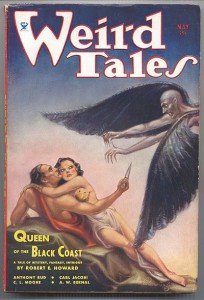 Howard: You’re absolutely right. Howard was all about the pacing, so much so that when he stumbles in other tales, even a little, it’s a shock. He didn’t just understand how to pace — and believe me, I’m positive that he put great thought into how to keep a story moving — he had an innate understanding of pacing, or it wouldn’t be so obvious even in his rough drafts. It’s almost always there, and it’s certainly present from the beginning in this story, pulling us forward.
Howard: You’re absolutely right. Howard was all about the pacing, so much so that when he stumbles in other tales, even a little, it’s a shock. He didn’t just understand how to pace — and believe me, I’m positive that he put great thought into how to keep a story moving — he had an innate understanding of pacing, or it wouldn’t be so obvious even in his rough drafts. It’s almost always there, and it’s certainly present from the beginning in this story, pulling us forward.
Bill: Agreed, and I think “Queen of the Black Coast” has one of the strongest openings so far in the series. Conan, much as he had in the beginning of “The Tower of the Elephant,” has run afoul of civilization’s incomprehensible ways. Again, it is his barbarian honor — in this instance the refusal to give up a friend — that leads to bloodshed (in the form of a murdered judge no less), and Conan must flee. Everything you need to know about Conan is provided in this tale, from a detailed physical description to his personal philosophy on points of honor and religion and, again, this is one of those stories that would serve as an excellent introduction to the character.
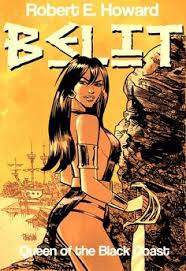 However, it is another character for whom this tale is famous, Bêlit, “untamed as a desert wind, supple and dangerous as a she-panther,” the titular “Queen of the Black Coast.” Neither the fainting damsel of the pulp tradition, nor the ridiculously masculinized warrior woman of so much hackneyed modern fantasy, Bêlit is a temptress who is worshiped as a goddess by her crew, but she is also a predator, a raider, and a strategist. She may indeed be a kind of sorceress, her sexuality alone commanding a kind of awe, and her own fierce love for Conan having a power that transcends the rational. In death, she saves Conan’s life, and what more explanation do we need for that feat other than that she said it would be so? She is a creature of iron will, and Conan is content for years to stay by her side, her equal in respect but her willing subordinate in other matters. She is the master pirate to whom Conan is apprenticed during what seems to me to be one of the most significant and formative periods of his life.
However, it is another character for whom this tale is famous, Bêlit, “untamed as a desert wind, supple and dangerous as a she-panther,” the titular “Queen of the Black Coast.” Neither the fainting damsel of the pulp tradition, nor the ridiculously masculinized warrior woman of so much hackneyed modern fantasy, Bêlit is a temptress who is worshiped as a goddess by her crew, but she is also a predator, a raider, and a strategist. She may indeed be a kind of sorceress, her sexuality alone commanding a kind of awe, and her own fierce love for Conan having a power that transcends the rational. In death, she saves Conan’s life, and what more explanation do we need for that feat other than that she said it would be so? She is a creature of iron will, and Conan is content for years to stay by her side, her equal in respect but her willing subordinate in other matters. She is the master pirate to whom Conan is apprenticed during what seems to me to be one of the most significant and formative periods of his life.
Howard: Indeed. And I’m not alone in wishing that Howard had written further of her. Alas, he did not, and we can only imagine other adventures he might have shared with her ourselves, or turn to the pastiche writers.
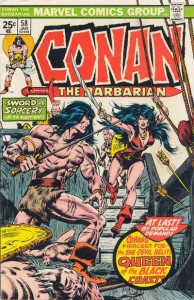 Bill: I would have loved that as well, but her scarcity does at least serve to heighten the mystique of her character. Bêlit can also be a polarizing character, unfortunately serving as a focus for whatever political or social hobbyhorse the critic wishes to brandish. To me she couldn’t be a clearer manifestation of H.Rider Haggard’s She, part of the tradition of colonial literature where lost pockets of civilization lie hidden in the blank spaces of the map, and adventurers can find themselves the overlords of exotic, technologically primitive, peoples. She commands a crew of islanders of the far south described as looking somewhat like Zulus, from whom she remains aloof, particularly sexually. Today’s race-obsessed bleaters will of course read some kind of racism into this, while missing the obvious narrative necessity of it. When one’s power is based on a sense of the other, one does not spoil it with intimacy. Officers don’t fraternize with enlisted, and gods-on-earth do not allow their human nature free reign. Daniel Dravot, while himself playing god, may have lost his head because of his interest in a native girl in Kipling’s “The Man Who Would Be King,” but ambitious, ruthless Bêlit would never make that same mistake.
Bill: I would have loved that as well, but her scarcity does at least serve to heighten the mystique of her character. Bêlit can also be a polarizing character, unfortunately serving as a focus for whatever political or social hobbyhorse the critic wishes to brandish. To me she couldn’t be a clearer manifestation of H.Rider Haggard’s She, part of the tradition of colonial literature where lost pockets of civilization lie hidden in the blank spaces of the map, and adventurers can find themselves the overlords of exotic, technologically primitive, peoples. She commands a crew of islanders of the far south described as looking somewhat like Zulus, from whom she remains aloof, particularly sexually. Today’s race-obsessed bleaters will of course read some kind of racism into this, while missing the obvious narrative necessity of it. When one’s power is based on a sense of the other, one does not spoil it with intimacy. Officers don’t fraternize with enlisted, and gods-on-earth do not allow their human nature free reign. Daniel Dravot, while himself playing god, may have lost his head because of his interest in a native girl in Kipling’s “The Man Who Would Be King,” but ambitious, ruthless Bêlit would never make that same mistake.
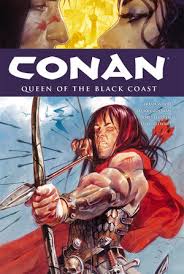 Howard: Oh, nicely argued, Bill.
Howard: Oh, nicely argued, Bill.
Bill: Much too can be said in criticism of her instant attraction, love really, for Conan — unless of course you’ve spent more than five minutes in the real world, where it happens all the time. Bêlit recognizes Conan for what he is immediately, a kindred spirit, as exceptional and gifted as she. It’s exactly what the Pirate Queen was waiting and hoping for — what most of us who haven’t found it are waiting for in our own mundane way. Perhaps a sharper critique could be leveled on the apparent lack of development of Conan and Bêlit’s love for one another in “Queen of the Black Coast,” but this, like so much else in these short tales, is handled not only with concision, but with a faith in the audience’s ability to understand these characters through their deeds alone. How do you not believe in a love that fights through death itself to save the life of the object of its devotion?
And it is to Bêlit that Conan bares his soul, giving the following famous lines, one of the purest expressions of his character:
Let me live deep while I live; let me know the rich juices of red meat and stinging wine on my palate, the hot embrace of white arms, the mad exultation of battle when the blue blades flame and crimson, and I am content. Let teachers and philosophers brood over questions of reality and illusion. I know this: if life is illusion, then I am no less an illusion, and being thus, the illusion is real to me. I live, I burn with life, I love, I slay, and am content.
Content by her side, though all things must end. Does Conan feel as strongly for Bêlit as she does for him? This is not necessarily any clearer to us than it is to Conan, and again we see REH for the psychologically astute writer that he is, as well as one that knows that simply telling an audience everything is the surest way to make them not care. Conan gives Bêlit a King’s funeral, her pyre heaped with the wealth of an empire, the wealth that, of course, was her undoing. It’s an act of profound respect and, perhaps also, an act of rejection — not of the woman, but of her nature. Hung up to die by the precious necklace she had chosen from the loot of the lost city while her slaughtered crew is gnawed by hyenas, the Pirate Queen and everyone around her pays the price for daring to grasp at too much. Conan, the only survivor, has by the end of the story grown richer only in loss, with ship, treasure, and queen consumed in a single funeral fire.
The above quote of Conan’s says nothing of wealth, ambition, or permanence. Conan, much later in life, takes for himself a kingdom when the opportunity presents itself, but he does not seek it out. Bêlit, I’d have to imagine, went about creating her own “kingdom” from the ground up, as a matter of policy, of ambitious and careful planning. And, unlike a later King Conan, she treats her subjects as disposable objects, and even the warnings of the man she loves are muffled by her fixation on the newly uncovered treasure. Ultimately, only her love for Conan survives death, her treasure gone down to mingle with her bones in the depths of the sea. Perhaps she should have learned from her lover to be content with what she had but then, of course, she would not have been Bêlit.
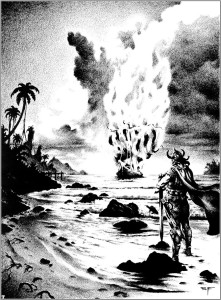 Howard: Bill’s comments were so inspired this week I have little to do apart from stand back and scratch my head and golf clap. I could point out that there’s some kick butt fight scenes, but that should really go without saying.
Howard: Bill’s comments were so inspired this week I have little to do apart from stand back and scratch my head and golf clap. I could point out that there’s some kick butt fight scenes, but that should really go without saying.
Bill: Thanks, Howard. There’s other great stuff as well that neither of us covered, a forgotten, non-human race devolved into a monstrous evil, a black lotus vision that is a brilliant way for REH to at once remove Conan from the action but allow him, and the reader, to see both the death of the crew and also the tale of the lost city itself, great character moments like Conan’s skill with the bow, a weapon that he nonetheless disdains as somewhat less than honorable … the list goes on. But, in the end, it really is Bêlit that looms largest.
Pirate one week, and general the next — join us here next Friday for “Black Colossus.”
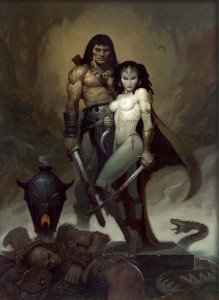
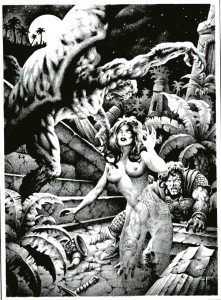
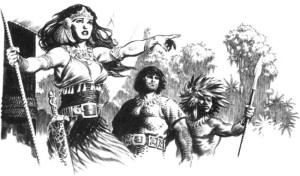
11 Comments